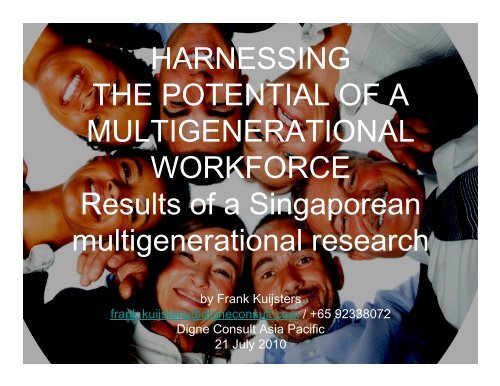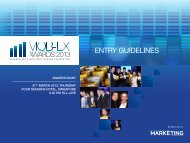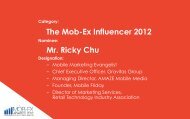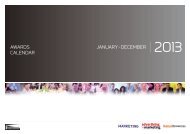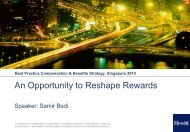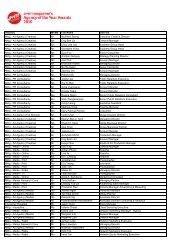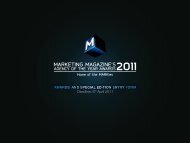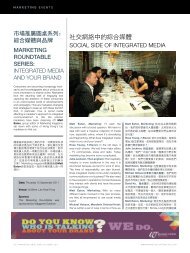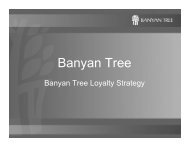HARNESSING THE POTENTIAL OF A MULTIGENERATIONAL ...
HARNESSING THE POTENTIAL OF A MULTIGENERATIONAL ...
HARNESSING THE POTENTIAL OF A MULTIGENERATIONAL ...
Create successful ePaper yourself
Turn your PDF publications into a flip-book with our unique Google optimized e-Paper software.
<strong>HARNESSING</strong><br />
<strong>THE</strong> <strong>POTENTIAL</strong> <strong>OF</strong> A<br />
<strong>MULTIGENERATIONAL</strong><br />
WORKFORCE<br />
Results of a Singaporean<br />
multigenerational research<br />
by Frank Kuijsters<br />
frank.kuijsters@digneconsult.com / +65 92338072<br />
Digne Consult Asia Pacific<br />
21 July 2010<br />
© Digne Consult Asia Pacific Pte Ltd / www.digneconsult.com.sg
RESEARCH OBJECTIVES<br />
• To obtain a clearer perspective of Singaporean<br />
individuals and the multi-generational challenges<br />
they may face in the workplace.<br />
• To shed light on the management implications of<br />
today’s multi-generational workforce.<br />
• To recommend the appropriate strategies for<br />
inter-generational collaboration.<br />
© Digne Consult Asia Pacific Pte Ltd / www.digneconsult.com.sg
FOUR DIFFERENT GENERATIONS<br />
• Traditionalist<br />
(born before 1945)<br />
• Baby Boomer<br />
(born 1946 - 1964)<br />
• Gen X (born 1965 -<br />
1980)<br />
• Gen Y (born after<br />
1980)<br />
© Digne Consult Asia Pacific Pte Ltd / www.digneconsult.com.sg
PR<strong>OF</strong>ILE 3541 RESPONDENTS<br />
Overall<br />
results<br />
Yers<br />
After 1980<br />
© Digne Consult Asia Pacific Pte Ltd / www.digneconsult.com.sg<br />
Xers<br />
1965 - 1980<br />
Late<br />
Boomers<br />
1955 - 1964<br />
Early<br />
Boomers<br />
1946 – 1954<br />
Silents<br />
Before 1946<br />
Respondents - 22% 45% 22% 10% 1%<br />
Male 39% 31% 43% 37% 39% 67%<br />
Female 61% 69% 57% 63% 61% 33%<br />
Primary and 1% 0% 0% 3% 1% 10%<br />
below<br />
Secondary 16% 4% 7% 34% 45% 43%<br />
Diploma 28% 36% 26% 27% 22% 24%<br />
University 55% 60% 67% 36% 32% 24%<br />
Director and<br />
above<br />
Manager or<br />
Supervisor<br />
Nonmanagerial<br />
position<br />
3% 0% 3% 6% 2% 10%<br />
40% 20% 48% 39% 48% 38%<br />
57% 80% 49% 54% 50% 52%
RESEARCH FINDINGS<br />
• How each generation perceives one another;<br />
• What motivates and drives their performance<br />
and loyalty to the organisation;<br />
• Their attitudes to work-life balance;<br />
• Preferred communication methods;<br />
• The way knowledge is transferred;<br />
• Notions of fair treatment associated with ageism<br />
and<br />
• Management style of immediate superiors.<br />
© Digne Consult Asia Pacific Pte Ltd / www.digneconsult.com.sg
RESEARCH FINDINGS – GEN Y<br />
More comfortable<br />
managing same age or<br />
younger employees<br />
Career & personal<br />
development are key<br />
motivators<br />
The value annual leave<br />
Appear more<br />
adaptable to change<br />
Have most difficulty<br />
working with Baby<br />
Boomers<br />
© Digne Consult Asia Pacific Pte Ltd / www.digneconsult.com.sg
RESEARCH FINDINGS – GEN X<br />
Gen X scores also high<br />
on customer service,<br />
work attitude<br />
Biggest group of<br />
managers<br />
Difficulties in<br />
collaboration with Baby<br />
boomers<br />
Experience less Work-<br />
Life harmony<br />
© Digne Consult Asia Pacific Pte Ltd / www.digneconsult.com.sg
RESEARCH FINDINGS – BABY BOOMERS<br />
Have no problems<br />
using email en social<br />
networking media<br />
Difficulty with Gen Ys<br />
Willing to work beyond<br />
contractual hours<br />
Elder care is more<br />
important than child care<br />
Interest in extended<br />
medical coverage<br />
© Digne Consult Asia Pacific Pte Ltd / www.digneconsult.com.sg
RESEARCH FINDINGS – TRADITIONALISTS<br />
Gen Ys – ‘I don’t<br />
understand them’<br />
Good work-life balance<br />
Feel comfortabel in their<br />
job<br />
Feel treated more unfair<br />
by employer<br />
Feel less embraced by<br />
colleagues<br />
Interest in phased<br />
retirement.<br />
© Digne Consult Asia Pacific Pte Ltd / www.digneconsult.com.sg
HOW DO <strong>THE</strong> DIFFERENT GENERATIONS<br />
PERCEIVE EACH O<strong>THE</strong>R?<br />
A multi generational organisation has a positive effect<br />
on performance of the organisation.<br />
Majority do not find it hard to work with colleagues of<br />
other age groups.<br />
Strengths of all generations are ability to multi-task and<br />
work independently<br />
Weakness of all generations is technological areas and<br />
creativity.<br />
To bridge the generational differences: train employees<br />
to create awareness and respect for each other and<br />
create opportunities to work with different age groups.<br />
© Digne Consult Asia Pacific Pte Ltd / www.digneconsult.com.sg
MOTIVATORES TO WORK FOR AND<br />
REMAIN IN AN ORGANISATION?<br />
• Most important motivators are: good pay and<br />
benefits<br />
• Least important motivators are: the organisation<br />
openly supports corporate social responsibility<br />
and the organisations’ reputation or having a<br />
well-known product in combination with clear<br />
values and vision<br />
• Important benefits to be provided by the<br />
organisation are: performance bonuses, good<br />
extended medical coverage and receiving<br />
recognition.<br />
© Digne Consult Asia Pacific Pte Ltd / www.digneconsult.com.sg
WORK-LIFE HARMONY AND<br />
GENERATIONS<br />
“Work-life Harmony programmes” are beneficial for<br />
productivity.<br />
All generations feel that it is sometimes acceptable<br />
to work beyond (contractual) working hours.<br />
The younger generations experience a lower worklife<br />
balance compared to the older generation.<br />
Most respondents would like to work beyond the<br />
standard retirement age.<br />
The younger generations are less eager to work<br />
beyond retirement age.<br />
© Digne Consult Asia Pacific Pte Ltd / www.digneconsult.com.sg
COMMUNICATION & KNOWLEDGE<br />
TRANSFER<br />
Face-to-face meetings, team<br />
meetings and email are the<br />
most preferred communication<br />
channels for all the generations.<br />
All generations mention that the<br />
most preferred styles for<br />
learning are:<br />
1. learning on the job,<br />
2. receiving feedback from<br />
manager/supervisor in combination<br />
with<br />
3. mentoring and<br />
4. coaching programmes<br />
© Digne Consult Asia Pacific Pte Ltd / www.digneconsult.com.sg
WHAT DO <strong>THE</strong>Y EXPECT FROM <strong>THE</strong>IR<br />
MANAGER?<br />
Age of their manager is for all generations not<br />
important.<br />
The most important characteristics of a manager for<br />
each generation are: caring, inspiring and competent.<br />
All generations expect from their current manager:<br />
clear directions and support, and constant constructive<br />
feedback.<br />
All score their current manager low in giving praise,<br />
providing feedback, recognition and rewards.<br />
The managers score high in giving freedom and<br />
flexibility to do their work, treating the employee as a<br />
full member of the organisation, no matter the position.<br />
© Digne Consult Asia Pacific Pte Ltd / www.digneconsult.com.sg
RECOMMENDATIONS FOR EFFECTIVE<br />
MANAGEMENT<br />
Identify your multigenerational workforce<br />
Identify the current age stereotypes needed for the job<br />
Encourage multigenerational teams<br />
Audit existing communications<br />
Offer flexible learning<br />
Encourage mentoring opportunities<br />
Provide multiple rewards, benefits and compensation<br />
options<br />
Raise employee awareness<br />
Raise supervisor capability and awareness<br />
Engage every employee regardless of generation<br />
© Digne Consult Asia Pacific Pte Ltd / www.digneconsult.com.sg


